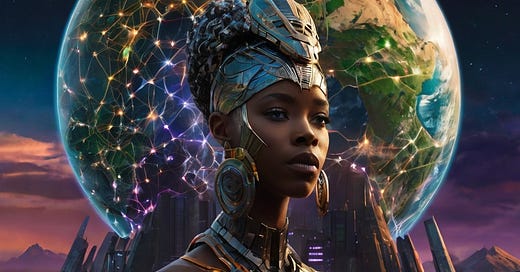I was living in Nairobi back in 2018 when Black Panther mania hit. I’m not a superhero film fan, but happily joined in on the frenzy. Like many other Nairobians, I dressed up in my finest African prints, rolled up to the cinema in a deep squad of friends and friends of friends, and posed for obligatory group photos flashing the ‘Wakanda Forever’ salute. Emerging from the bustle and chaos of Nairobi rush-hour traffic and into a cinematic techno-fantasy version of Africa was surreal and thrilling.
Black Panther propelled the Afrofuturism movement into the mainstream and contains all its hallmarks — alternative histories (the fictional Wakanda was never colonized), futuristic utopias (Wakanda is one of the most technologically advanced countries on earth), and Afrocentricism (the Wakanda-verse centers African art, fashion, symbols and mythologies).
For some, Afrofuturism is a necessary counter to the marginalization and damaging stereotypes that Africans and black people are subjected to in mainstream culture, a much-needed healing balm and source of pride. For others, it is mere escapism.
An alternative view is that these escapist narratives can spur action in the real world by inspiring new and inclusive visions of the future of Africa and broader society. The obvious challenge is that Afrofuturism has its roots in the world of art and culture, which can feel, and often is, far removed from the empirical and dry world of development policy. When I looked deeper, however, I found a range of subtle and often unexpected connections. In fact, many policy wonks are inadvertently dabbling in speculative Afrofuturism — but they could do it far more productively. Let’s explore how.
African Policy Discourse is Caught Between Hyper-Incrementalism and Radical Techno-Optimism
At its heart, most policy work is an act of informed and constructive speculation. We draw on expertise and empirical evidence to anchor our recommendations, but ultimately we must project future outcomes on highly complex and uncertain societal issues. Working on African energy and tech policy, engaging in these speculative leaps is a particularly significant part of our job. A mix of limited historical trend data, major economic and socio-political transformation across the region, and the backdrop of fast changing global technology and geopolitics makes it especially difficult to project likely future pathways and outcomes.
As a result of these epistemological constraints, policy discourse on African energy and tech futures often falls into one of two extremes: unambitious hyper-incrementalism or radical techno-optimism.
The unambitious hyper-incrementalists are keenly aware of the stark realities on the ground — extreme poverty, political dysfunction, massive gaps in infrastructure and human capacity — and project the future out conservatively from this baseline. To them, Africa is poor now, and will have to claw itself out of this poverty slowly and surely, following the known paths from a subsistence to industrialized economy.
The radical techno-optimists, on the other hand, are often unconstrained by these facts on the ground. To them, Africa is a blank canvas on which to test out a grand leapfrogging vision, the idea that poor countries can use new technologies to bypass traditional stages of development. No infrastructure? No problem. In fact, even better — none of those annoying legacy systems getting in the way of a brave new world.
How do these two modes manifest in the real world?
On Africa’s energy poverty challenge, for example, a notable exemplar of unambitious hyper-incrementalism is the low bar set by Sustainable Development Goal 7 (SDG7), which defines modern energy access at levels too low to achieve meaningful development. The methodology for tracking progress against SDG7 relies on data from the World Bank and the International Energy Agency, which consider a household to have access if they have enough electricity to power basic lighting and phone charging. This does formalize an important threshold for extreme energy poverty — that is the first rung out of literal darkness for the over 500 million people across Africa living without access to electricity — but effectively remains silent on what happens next both in households and the broader economy.
Multiple groups have proposed additional metrics for energy poverty that try to project what energy consumption looks like beyond this minimum standard (e.g. the World Bank’s Multi-Tier Framework and the Modern Energy Minimum from my colleagues at the Energy for Growth Hub), but none of these have made their way into the formal process by which we define and measure progress towards ending energy poverty and achieving SDG7. Meanwhile, on the other extreme of the future gazing spectrum, radical techno-optimists continue to advocate for a wide range of far-fetched energy pathways on the African continent, such as overestimating the role of private-sector business models in providing affordable energy services to people living in extreme energy poverty, or the rising popularity of unrealistic scenarios projecting 100% renewable energy systems in Africa in just a matter of decades.
In tech, the recent artificial intelligence boom has provided fertile breeding ground for radical techno-optimism run amok, leading to all manner of dubious predictions — such as the oft-repeated claim that Africa could capture 10% of the trillion dollar AI market market by 2030, equivalent to half of the continent’s current GDP. The hyper-incrementalists, meanwhile, are hard at work turning the slow and creaky wheels of national, regional, and international bureaucracies to churn out policy position papers that are completely at odds with the pace and scale of AI’s opportunities and threats on the continent. This includes the relentless parade of sprawling and generic “digital transformation” strategies popping up across Africa, as well as the UN General Assembly’s recent resolution on the promotion of “safe, secure and trustworthy” AI for sustainable development that variously affirms, recognizes, takes note of, emphasizes, encourages, and calls upon member states to take action. The intent behind these policy documents is commendable, but formulaic policy boilerplate is a weak strategy for guiding the future trajectory of AI in poor countries and across the globe.
Three Principles for Effective Afrofuturism in Policy
Speculation is clearly an integral part of our job description as wonks, thinkers, and advisors. And despite the many unknowns, we must explore and frame possible African energy and tech futures. But neither the unambitious hyper-incrementalist nor the radical techno-optimist approaches are up to the task. What then is the optimal balance of pragmatism and optimism for effective Afrofuturism in the policy realm? There is clearly no definitive answer to this question because every issue and every context is different — but we can apply some universal principles to policy Afrofuturism going forward. Here are my top three principles:
Ambition is a moral imperative: We cannot continue to live in the 21st century with some people relegated to a medieval existence of poverty. In this context, extreme conservatism and incrementalism seem like a capitulation, effectively accepting the status quo. Therefore, we have a moral duty to think bigger and set high goals for Africa's future. We cannot rely solely on traditional policy methods; we need to challenge ourselves with "what-ifs" to inspire new ideas and reverse-engineer ambitious solutions. In this regard, radical techno-optimists have a point: we must experiment, involve non-traditional actors, and test innovative ideas. Every policy expert, whether in think tanks, government, international organizations, or academia, should have dedicated time for creative and unconventional thinking as a core part of their role.
Focus on the constraints that matter: Our constraints are real, so we cannot completely discard pragmatic incrementalism that scrutinizes and eases these constraints step by step. However, we must not be paralyzed by constraints, just as we must reject the idea of silver-bullet solutions. A balanced approach starts with identifying the most critical constraints. While specifics will vary by issue and context, some major enabling factors are indispensable and universally important, forming the basis of a “no-regrets'' development strategy. These include stable political institutions, foundational physical infrastructure (e.g. power, transport, digital), a functional knowledge ecosystem (e.g. data systems, research, translation), and adequate social services (e.g. health, education). These are bread and butter concerns of hyper-incrementalists, and radical techno-optimists are wrong to downplay their importance. However, we cannot wait for perfect conditions. This means that we might have to ignore established “best practices”, opting instead for a nimble and opportunistic approach to policy that is responsive to evolving circumstances and can hit on the right constraints, in the right place, at the right time. For example, despite over two decades of global collaboration to close the digital divide, only 36% of Africans have access to broadband internet and 2.7 billion globally remain offline. In light of this dismal progress, the technology for development community is justifiably worried that AI will exacerbate these existing inequalities and leave the world’s poorest behind. However, AI adoption has been uneven globally, including in rich countries like the United States where uptake is concentrated in larger companies in specific sectors. Rather than starting with AI promotion at the bottom of the pyramid in the world’s poorest countries, early efforts could target the constraints most relevant to untapped first movers in these contexts — enterprises, startups, research institutions — particularly unreliable power, limited local data center capacity, prohibitive cloud computing costs, and data gaps.
Ensure African agency: In the African development and future mapping arena, donors, philanthropists, entrepreneurs, think tankers, humanitarians, and activists each bring their own interests and agenda to the table. Ultimately, however, all these actors must defer to the will of African citizens and their representative governments to choose their path. This is especially pertinent in the energy and climate domain, where many international funders prescribe solutions and prioritize agendas that may not align with African development goals. In our line of work, ensuring African agency means putting African experts at the forefront of policy analysis and advice, rather than the prevalent reliance on external experts. External actors should facilitate and prioritize African-owned ambitions and plans, aligning support accordingly. Centering intellectual leadership by Africans is a critical prerequisite to make sure that the aspirations of one billion Africans are framed and represented appropriately in our policy discourse.
Shaping African futures is important work. By 2100 38% of the global population — and almost half of the world’s youth — will be in Africa, meaning that in an important sense, all futurism is actually Afrofuturism. Effective Afrofuturism is a call to action for the policy community to revisit development challenges that have languished in the “too difficult” bucket — and for which our hyper-incremental and techno-optimistic ministrations have yielded little progress — grounding ourselves in both empirics and inspired moral vision.
Black Panther’s Wakanda is obviously a poor model for real-world African nations — with its hereditary government, isolationist policies, and reliance on a powerful rare metal — and belongs in the world of fiction. The power of Wakanda lies more in its ability to inspire imagination and challenge boundaries. We must not relinquish all the ambitious future gazing to the arts and culture flank of Afrofuturism — policy wonks have a big role to play in constructing visions of Africa’s future that have serious real world implications. Let’s try and make our Afrofuturism more ambitious, more realistic and more African.






Thanks for writing this Rose. Ambition is a moral imperitive. Adding you to my list of favorite African Accelerationists. 😀 At africanaccelerationism.com
Thought provoking, thanks so much for posting